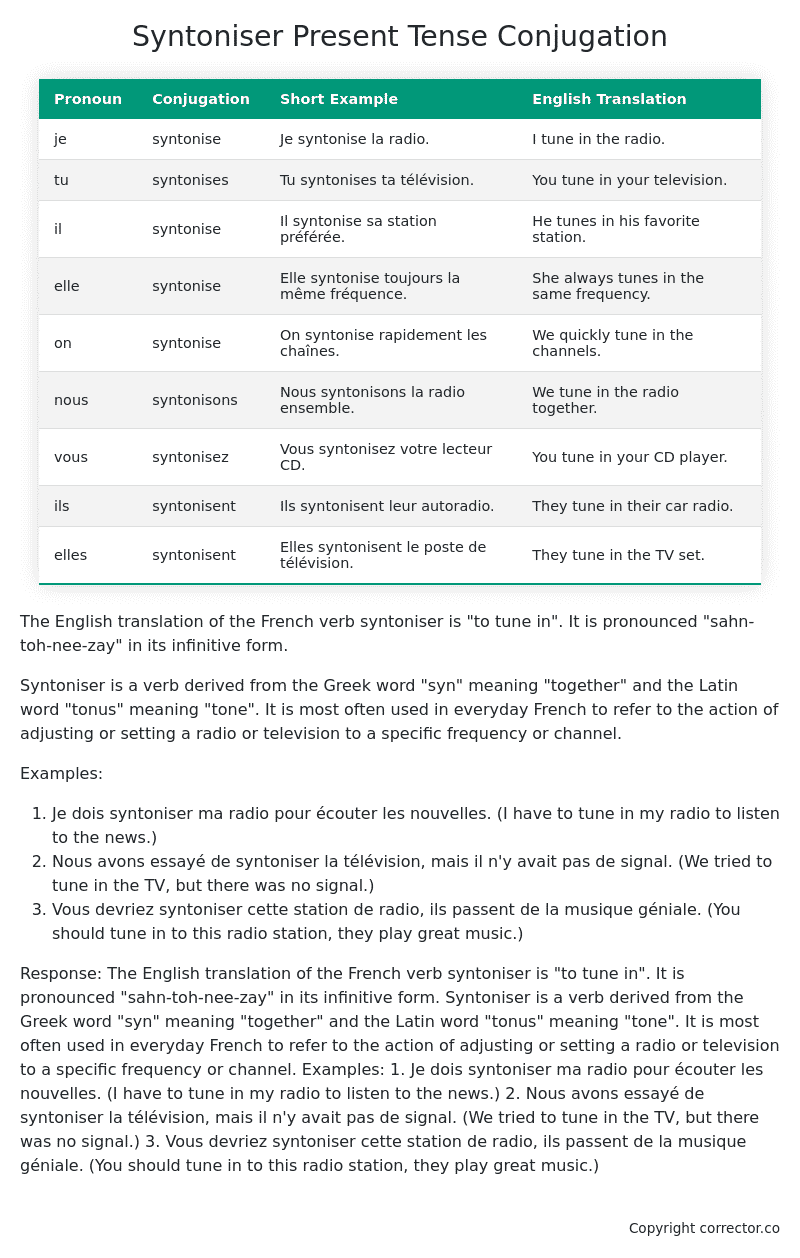Le Present (Present Tense) Conjugation of the French Verb syntoniser
Introduction to the verb syntoniser
The English translation of the French verb syntoniser is “to tune in”. It is pronounced “sahn-toh-nee-zay” in its infinitive form.
Syntoniser is a verb derived from the Greek word “syn” meaning “together” and the Latin word “tonus” meaning “tone”. It is most often used in everyday French to refer to the action of adjusting or setting a radio or television to a specific frequency or channel.
Examples:
- Je dois syntoniser ma radio pour écouter les nouvelles. (I have to tune in my radio to listen to the news.)
- Nous avons essayé de syntoniser la télévision, mais il n’y avait pas de signal. (We tried to tune in the TV, but there was no signal.)
- Vous devriez syntoniser cette station de radio, ils passent de la musique géniale. (You should tune in to this radio station, they play great music.)
Response: The English translation of the French verb syntoniser is “to tune in”. It is pronounced “sahn-toh-nee-zay” in its infinitive form. Syntoniser is a verb derived from the Greek word “syn” meaning “together” and the Latin word “tonus” meaning “tone”. It is most often used in everyday French to refer to the action of adjusting or setting a radio or television to a specific frequency or channel. Examples: 1. Je dois syntoniser ma radio pour écouter les nouvelles. (I have to tune in my radio to listen to the news.) 2. Nous avons essayé de syntoniser la télévision, mais il n’y avait pas de signal. (We tried to tune in the TV, but there was no signal.) 3. Vous devriez syntoniser cette station de radio, ils passent de la musique géniale. (You should tune in to this radio station, they play great music.)
Syntoniser – About the French Present Tense
To take a deep dive into all the French tenses then see our article on Mastering French Tense Conjugation.
Common Everyday Usage Patterns For Le Present
Interactions with Other Tenses
Table of the Present Tense Conjugation of syntoniser
| Pronoun | Conjugation | Short Example | English Translation |
|---|---|---|---|
| je | syntonise | Je syntonise la radio. | I tune in the radio. |
| tu | syntonises | Tu syntonises ta télévision. | You tune in your television. |
| il | syntonise | Il syntonise sa station préférée. | He tunes in his favorite station. |
| elle | syntonise | Elle syntonise toujours la même fréquence. | She always tunes in the same frequency. |
| on | syntonise | On syntonise rapidement les chaînes. | We quickly tune in the channels. |
| nous | syntonisons | Nous syntonisons la radio ensemble. | We tune in the radio together. |
| vous | syntonisez | Vous syntonisez votre lecteur CD. | You tune in your CD player. |
| ils | syntonisent | Ils syntonisent leur autoradio. | They tune in their car radio. |
| elles | syntonisent | Elles syntonisent le poste de télévision. | They tune in the TV set. |
Other Conjugations for Syntoniser.
Le Present (Present Tense) Conjugation of the French Verb syntoniser (this article)
Imparfait (Imperfect) Tense Conjugation of the French Verb syntoniser
Passé Simple (Simple Past) Tense Conjugation of the French Verb syntoniser
Passé Composé (Present Perfect) Tense Conjugation of the French Verb syntoniser
Futur Simple (Simple Future) Tense Conjugation of the French Verb syntoniser
Futur Proche (Near Future) Tense Conjugation of the French Verb syntoniser
Plus-que-parfait (Pluperfect) Tense Conjugation of the French Verb syntoniser
Passé Antérieur (Past Anterior) Tense Conjugation of the French Verb syntoniser
Futur Antérieur (Future Anterior) Tense Conjugation of the French Verb syntoniser
Subjonctif Présent (Subjunctive Present) Tense Conjugation of the French Verb syntoniser
Subjonctif Passé (Subjunctive Past) Tense Conjugation of the French Verb syntoniser
Subjonctif Imparfait (Subjunctive Imperfect) Tense Conjugation of the French Verb syntoniser
Subjonctif Plus-que-parfait (Subjunctive Pluperfect) Tense Conjugation of the French Verb syntoniser
Conditionnel Présent (Conditional Present) Tense Conjugation of the French Verb syntoniser
Conditionnel Passé (Conditional Past) Tense Conjugation of the French Verb syntoniser
L’impératif Présent (Imperative Present) Tense Conjugation of the French Verb syntoniser
L’infinitif Présent (Infinitive Present) Tense Conjugation of the French Verb syntoniser
Struggling with French verbs or the language in general? Why not use our free French Grammar Checker – no registration required!
Get a FREE Download Study Sheet of this Conjugation 🔥
Simply right click the image below, click “save image” and get your free reference for the syntoniser Present Tense tense conjugation!

I hope you enjoyed this article on the verb syntoniser. Still in a learning mood? Check out another TOTALLY random French verb present conjugation!


